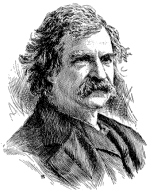The Boys’ Life of Mark Twain
by Paine

XXIX. The Visit to Elmira and Its Consequences
Samuel Clemens now decided to pay his long-deferred visit to the Langdon home in Elmira. Through Charlie Langdon he got the invitation renewed, and for a glorious week enjoyed the generous hospitality of the beautiful Langdon home and the society of fair Olivia Langdon–Livy, as they called her–realizing more and more that for him there could never be any other woman in the world. He spoke no word of this to her, but on the morning of the day when his visit would end he relieved himself to Charlie Langdon, much to the young man’s alarm. Greatly as he admired Mark Twain himself, he did not think him, or, indeed, any man, good enough for “Livy,” whom he considered little short of a saint. Clemens was to take a train that evening, but young Langdon said, when he recovered:
“Look here, Clemens, there’s a train in half an hour. I’ll help you catch it. Don’t wait until tonight; go now!”
Mark Twain shook his head.
“No, Charlie,” he said, in his gentle drawl. “I want to enjoy your hospitality a little longer. I promise to be circumspect, and I’ll go to-night.”
That night after dinner, when it was time to take the train, a light two- seated wagon was at the gate. Young Langdon and his guest took the back seat, which, for some reason, had not been locked in its place. The horse started with a quick forward spring, and the seat with its two occupants described a circle and landed with force on the cobbled street.
Neither passenger was seriously hurt–only dazed a little for the moment. But to Mark Twain there came a sudden inspiration. Here was a chance to prolong his visit. When the Langdon household gathered with restoratives, he did not recover at once, and allowed himself to be supported to an arm-chair for further remedies. Livy Langdon showed especial anxiety.
He was not allowed to go, now, of course; he must stay until it was certain that his recovery was complete. Perhaps he had been internally injured. His visit was prolonged two weeks, two weeks of pure happiness, and when he went away he had fully resolved to win Livy Langdon for his wife.
Mark Twain now went to Hartford to look after his book proofs, and there for the first time met the Rev. Joseph H. Twichell, who would become his closest friend. The two men, so different in many ways, always had the fondest admiration for each other; each recognized in the other great courage, humanity, and sympathy. Clemens would gladly have remained in Hartford that winter. Twichell presented him to many congenial people, including Charles Dudley Warner, Harriet Beecher Stowe, and other writing folk. But flattering lecture offers were made him, and he could no longer refuse.
He called his new lecture “The Vandal Abroad,” it being chapters from the forthcoming book, and it was a great success everywhere. His houses were crowded; the newspapers were enthusiastic. His delivery was described as a “long, monotonous drawl, with fun invariably coming in at the end of a sentence–after a pause.” He began to be recognized everywhere–to have great popularity. People came out on the street to see him pass.
Many of his lecture engagements were in central New York, no great distance from Elmira. He had a standing invitation to visit the Langdon home, and went when he could. His courtship, however, was not entirely smooth. Much as Mr. Langdon honored his gifts and admired him personally, he feared that his daughter, who had known so little of life and the outside world, and the brilliant traveler, lecturer, author, might not find happiness in marriage. Many absurd stories have been told of Mark Twain’s first interview with Jervis Langdon on this subject, but these are without foundation. It was an earnest discussion on both sides, and left Samuel Clemens rather crestfallen, though not without hope. More than once the subject was discussed between the two men that winter as the lecturer came and went, his fame always growing. In time the Langdon household had grown to feel that he belonged to them. It would be only a step further to make him really one of the family.
There was no positive engagement at first, for it was agreed between Clemens and Jervis Langdon that letters should be sent by Mr. Langdon to those who had known his would-be son-in-law earlier, with inquiries as to his past conduct and general character. It was a good while till answers to these came, and when they arrived Samuel Clemens was on hand to learn the result. Mr. Langdon had a rather solemn look when they were alone together.
Clemens asked, “You’ve heard from those gentlemen out there?”
“Yes, and from another gentlemen I wrote to concerning you.”
“They don’t appear to have been very enthusiastic, from your manner.”
“Well, yes, some of them were.”
“I suppose I may ask what particular form their emotion took.”
“Oh, yes, yes; they agree unanimously that you are a brilliant, able man- -a man with a future, and that you would make about the worst husband on record.”
The applicant had a forlorn look. “There is nothing very evasive about that,” he said.
Langdon reflected.
“Haven’t you any other friend that you could suggest?”
“Apparently none whose testimony would be valuable.”
Jervis Langdon held out his hand.
“You have at least one,” he said. “I believe in you. I know you better then they do.”
The engagement of Samuel Langhorne Clemens and Olivia Lewis Langdon was ratified next day, February 4, 1869. To Jane Clemens her son wrote: “She is a little body, but she hasn’t her peer in Christendom.”
 Continue...
Continue...![[Buy at Amazon]](http://images.amazon.com/images/P/B0006AHKG6.01.MZZZZZZZ.jpg)